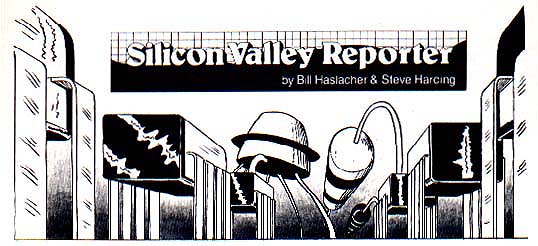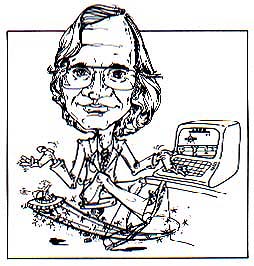
|
Here comes a blue planet. Prepare to land. The view is fantastic. But wait. A strange temple lies right ahead. Crash, zap, bam. The temple becomes your tomb.
New Hollywood science fiction movie? No, it's Moonsweeper, a video game from Imagic.
Recently, Bob Smith, the game's designer, took me into the Imagic lab to see this new game. He yelled to others before taking me in to see if anything "top secret" was on the screens. Everything was OK. Stereo music filled the room, and interesting graphics filled the screens.
Moonsweeper is an impressive 3-D space game with some new twists. It starts with a red sun radiating high-resolution solar flares. You can shoot or avoid the flares. Some of the objects coming at you are planets. You get to choose the planet you want. Blue is the easiest. Red is the hardest. I saw a blue planet coming, and I chose it. Wow, the landing on the planet is sure dramatic!
Bob Smith gave me insight into game design. He says the idea for Moonsweeper "started with the landing on the planet effect" and built from this effect.
Smith believes some of the best game ideas come from creative sessions in the lab. He feels game programmers make a big mistake if they do not listen to other game designers, because fellow programmers can see mistakes and help make a game better.
Smith is one of a number of former Atari employees now working at Imagic. David Johnson and Brad Stewart are others. At Atari Smith wrote Atari Pinball and a number of Home Computer Games.
"Imagic is more like Atari than Atari was," says Smith. "The lab is crowded on weekends and is an enjoyable place to be."
You won't find many Easter Eggs at Imagic. Easter Eggs are hidden messages planted in ROM code. The first Easter Eggs were the programmer's initials planted in ROM. Atari marketing was surprised to learn that if you took a gold dot out of the gold room in Adventure, you would see the programmer's initials flash on the screen.
Another example of an Easter Egg is found in Missile Command. By not pressing the red button in Missile Command bombs destroy your bases and you get to see the programmer's initials. Bob Smith thinks Easter Eggs are fun, but so far he has not put any into his code. This reporter feels part of the reason Smith does not use Easter Eggs is because Imagic programmers get lots of credit and applause for their work.
Game Design Tips
What are Bob Smith's recommendations for getting into game design? "You don't have to be a scientist or mathematician to get into game programming. You should be creative and you should know assembly language and a little math."
Why is math important? "I'm using matrix algebra and that kind of thing in the 3-D space games now," he says. "We have some new development machines for much of the drudgery." Imagic has developed two state-of-the-art graphics machines and one sound machine, which Smith says allow automatic data passing and other programming aids.
Smith feels some of the truly great video games will live forever. Two of his own favorites are Breakout and Space Invaders. "Qix is good," says Bob, "it might even become a classic. Spider-Man by Parker Brothers for the VCS is an interesting game, but it also has some glaring flaws."
The future of video games? Smith says,"Video games will achieve even better visual and sound effects." He is particularly impressed with the graphics capability of Dragon's Lair, a new coin-operated laser-disk game that is a hit in video game arcades.
Smith believes video games have some value beyond entertainment for young children. "They improve attention span and eye-hand coordination," he says. When Bob Smith was growing up his family loved to play card games, puzzles and all kinds of games. Pure dice games are not among Smith's favorites, however. The reason: "I prefer games with a bit more elan in them." He is sure that the love for games he developed as a child has turned into a passion for developing exciting video games for Imagic.
What Next for Smith?
Bob Smith's big interest in life; outside of gaming, is his family. Steven, age 5, has just learned to yell Bug! when he sees a programming mistake. Adam, age 6, is getting pretty good at playing video ames. And his wife, Kathy, cheerfully puts up with video games.
What is Smith's next project? A game for the ATARI Home Computer System is beginning to take shape, he says.
Rumors... I love 'em. All kinds of interesting things have been making their way twixt tongue and ear around Silicon Valley lately.
Did you know that not only has Atari decided not to market their Graduate keyboard for the VCS 2600, they are going out of the computer business altogether? That's the latest piece of nonsense making the rounds.
Seems that, according to the story, Atari has decided their strength lays in software. Supposedly they're giving up the hardware side of the business. Or . . . if you want to believe another story . . . since Atari has lost so many talented programmers to third-party software houses, they have decided to forget about creating new software for the 2600/5200 and dedicate themselves to the hardware side of the business.
Another interesting tidbit I heard recently . . . Commodore has made Warner an offer for Atari. The powers that be are seriously considering it. Who knows?
Let me tell you a little story. Once upon a time, about 1978 BC (Before Computers), Atari's main competitor in the marketplace was Mattel Electronics. The marketing and sales executives at Atari were concerned with the impact that they thought Mattel was going to make on the marketplace and were scurrying around conceiving new marketing ploys to circumvent it. This was just after the Video Computer System had been introduced and had not sold as well as these marketing gurus had anticipated. They were nervous.
The people designing the Game Programs were well insulated from the marketing folk, as they were housed in a separate building.
One day, when things were a bit slow, a Friday, as I recall (probably shortly before one of the regularly scheduled Friday afternoon beer runs--Oh . . . those were the days), one of the staff poked his head out of his office and yelled, "we haven't had a good juicy rumor in months. It's time one got started. Did you know that the (Atari) Consumer Division is going to be sold to Mattel?" Everybody giggled, saying, "Gee, what a neat rumor."
About ten days later, the vice-president in charge of that group called everyone together. In very serious tones he stated, "There is absolutely no truth to the rumor that Mattel is going to buy the Consumer Division and lay everybody off. Your jobs are secure and there is nothing to worry about." Later there was a great deal of snickering.
Moral of the story . . . don't believe anything about the doings and goings on at Atari until it happens. And then, take it with a grain of salt.

|
There has been a great deal of talk recently about pirate software, both in the computer industry trade press and the various computer interest magazines. It seems that, in some cases, the consumer feels that once that dollar is in the merchant's till the software is his to do with what he will. Or, understandably, the consumer wants to have a copy of the program, in case something happens to the original.
The manufacturer says that all the consumer is buying is the right to use the software, and not the program itself. So why is the price so high? That's to recover the profits lost from the pirated software.
There is a lot to be said for both sides.
Adventure International has devised a scheme that is welcome news. They are packing a coupon with their programs that entitles the buyer to purchase a back-up copy for only $3.99. That just barely covers the cost of the media and mailing.
More software manufacturers should follow their lead. It won't stop software piracy, but the policy does make for happy customers.
Bill Haslacher lives in the heart of Silicon Valley. He is a regular contributor to Hi-Res. Steve Harding is West Coast Editor of Hi-Res.